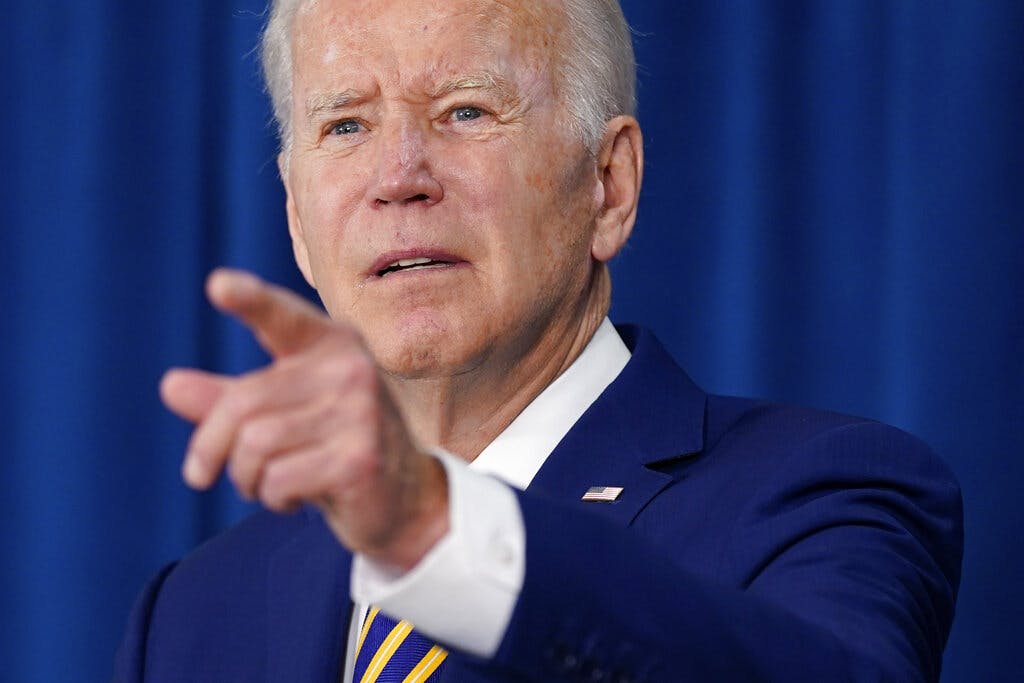Could Jerusalem Be the Price of Biden’s Deal With the Saudis for Oil?
The President prepares to sacrifice the Israeli capital in his quest to bring down oil prices.

Ahead of an as yet unannounced Mideast trip that President Biden predicts would lead to enhanced security for Israelis and Arabs, America is apparently attempting to appease Saudi Arabia by opening a de facto consulate in Jerusalem to cater to Palestinians.
The new American Office of Palestinian Affairs would on “substantive matters” bypass America’s embassy to Israel that is now in Jerusalem and report directly to Washington, according to a spokesman of the mission, who explained the move to Reuters late last week. It would replace the Palestinian Affairs Unit, which currently is a section inside the American embassy in Israel.
The new office would be housed in the same building where the consulate for Palestinian affairs used to reside. The building is in the western section of the city, which is predominantly Jewish. The American embassy is also situated in the western part of the capital.
The move, announced late last week, is bound to anger Israeli officials and their supporters in Washington. It also might well violate the Jerusalem Embassy Act, a 1995 bipartisan law that dictated the move of the American embassy to the Israeli capital from Tel Aviv.
Several American presidents cited security considerations for keeping the embassy at Tel Aviv before President Trump finally obeyed the law in 2018 and relocated the embassy to Jerusalem. Contrary to predictions that this would lead to riots in Arab countries, the embassy move opened the way to a new round of peacemaking that was followed by the Abraham Accords.
While Washington’s current action falls short of formally opening a consulate in Jerusalem, it signals a reversal of Mr. Trump’s reorganization of America’s diplomacy on the Israeli-Palestinian front. Mr. Biden, meanwhile, is directing attention to what may be a “much larger” diplomatic breakthrough.
On Saturday Mr. Biden hinted at an announcement on relations between Israel and Saudi Arabia. Telling a reporter he has not yet made a decision on going to Riyadh in the coming weeks, Mr. Biden nevertheless said the trip would be about more than just begging the Saudis to pump more oil.
“It happens to be a larger meeting taking place in Saudi Arabia,” Mr. Biden said. “That’s the reason I’m going. And it has to do with national security for them, for Israelis … it has to do with much larger issues than having to do with the energy piece.”
King Salman of Saudi Arabia has long insisted any warmup of relations between his country and Israel is linked to progress toward the formation of a Palestinian state. He pushes for implementing the Saudi-sponsored Arab Peace Initiative, signed at Beirut in 2002.
Washington’s latest gesture, signaling to Palestinians that they could have parts of Jerusalem as their capital, might well be designed to satisfy the aging king’s demand, and a return to the Arab initiative. It would also signal a return to the Washington establishment’s received wisdom that, like the Arab plan, posits that no new peace between Arab countries and Israel could be achieved as long as the Israeli-Palestinian dispute remains unresolved.
Mr. Trump reversed that “inside out” thinking with an “outside in” approach, positing that once peace with the Arab states would be established, the Palestinians would come along as well.
That was the premise of the Abraham Accords, a set of peace treaties between Israel and four Arab countries that revised the thinking in many Arab countries, including some that are yet to join the accords.
No such progress, however, is expected with the Palestinians before their 87-year-old president, Mahmoud Abbas, is replaced as the Palestinian Authority’s chief. Nor are any of his would-be heirs, which could launch a bloody war between them, ready to concede anything less than full Arab sovereignty over East Jerusalem.
Mr. Abbas has demanded Mr. Biden reopen the consulate that was shut when Mr. Trump relocated the American embassy to the Israeli capital. Mr. Biden promised he would. “We will be moving forward with the process of opening a consulate as part of deepening those ties with the Palestinians,” Secretary of State Blinken said in October.
A State Department envoy to the peace process, Hadi Amr, conferred with Mr. Abbas and other Palestinian Authpority officials last week in Ramallah. Soon afterward, the reopening of the newly named de facto consulate was announced.
America never recognized Israel’s annexation of the mostly Arab-populated eastern part of Jerusalem, arguing that the future of the entire city should be determined by direct negotiations.
By relocating the American embassy to Jerusalem, Mr. Trump for the first time signaled official American recognition of Israeli sovereignty over at least the western part of the capital. Reopening a Palestinian consulate in that part of the city would signal a reversal of that recognition.
Israelis oppose any redivision of their capital, or even a hint of Palestinian sovereignty there. “There is no place for a U.S. consulate which serves the Palestinians in Jerusalem,” Prime Minister Bennett said last winter. If the Americans “want to open a consulate in Ramallah, we have no problem with that,” the Israeli foreign minister, Yair Lapid, added.

